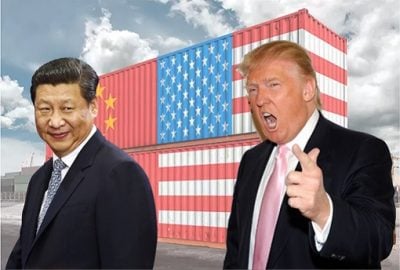Trump Is No Longer Interested in Trade Deal with China?

U.S. President Donald Trump is losing interest in the trade deal he made with China, according to his economic adviser, and the reason could be that as we progress further into the election season, fixing relations with China is less important than distracting the population from his failure to handle and contain the coronavirus pandemic. The trade deal between the U.S. and China is not that important anymore for Trump, according to Larry Kudlow, director of the U.S. National Economic Council and assistant to the president for economic affairs, who also said the trade agreement reached in January remains unchanged for the time being, but Trump would observe the degree of compliance by Beijing with its obligations.
Previously, the Trump administration did not hide that the trade agreement with China plays a crucial political role for Trump’s re-election. Efforts made by the U.S. President in 2019 to get the best deal for the U.S. led to the signing of “Phase 1” of the agreement in January, in which China pledged to increase U.S. goods imports by $200 billion in two years, compared to the 2017 level, and the U.S., in turn, abolished a series of tariff duties.
Under the terms of the agreement, negotiations on Phase 2 should proceed depending on how Phase 1 of the agreement is implemented. Many U.S. experts feared that due to the coronavirus pandemic, China would not be able to fulfill its obligations to purchase American products. The U.S. Department of Agriculture released data that revealed the sales of corn and pork to China increased eight times compared to the 2017 level, cotton increased three times over the same year, and the supply of soy to China increased by a third.
Data from S&P Global Market Intelligence indicated that U.S. exports to China were $21.2 billion lower in the first quarter than previously planned, with the statistics being mainly hampered by sources of energy, especially liquefied natural gas. In order to strictly fulfil all conditions in terms of price volume, and taking into account the fall in oil prices, China would have to buy around three million barrels of oil per day from the U.S., which would be equal to the entire volume of daily U.S. oil exports, a task that seems impossible even under normal conditions, let alone during a sharp drop in economic activity.
Despite the continuing deterioration in relations between the two countries, China still emphasizes its commitment in fulfilling its obligations. Even in Li Keqiang’s annual report, number two in the country’s Communist Party Politburo, it states that China will do its best to consistently implement Phase 1 of the agreement. The Chinese official’s report calls for private business structures to also be guided by his indications. Keeping in mind that this year some of the most important targets, including GDP growth, were not mentioned in the report, it did however detail that the trade agreement between China and the U.S. can send a clear signal about the great importance that the Chinese authorities attach to the fulfilment of their obligations.
Still, Trump’s economic adviser said the deal is no longer of great importance to the U.S. president as he is reportedly very angry with China over the coronavirus pandemic and other problems. Everyone remembers the importance of the trade agreement for Trump and some American experts have even feared that the president would make a deal that would be unfavorable to the U.S. just for the sake of formally signing an agreement with China.
However, it is likely that Trump’s inconsistent attitude is only during this re-election cycle and that relations could be more normalized if Trump is re-elected. This does not discount though that this makes Trump very volatile and unpredictable. Trump’s shift in position is now linked to domestic economic and health problems. At the same time, the trade war with China has failed to achieve Trump’s goals to return production and industry to the U.S. and reduce trade imbalances.
The coronavirus pandemic also further exacerbated existing problems and, as a result, the U.S. economy is in recession. China remains committed to strict implementation of the First Phase of the agreement and is ready to take practical steps to increase the acquisition of relevant assets in the U.S., even with the difficult epidemiological situation. The trade deficit with China continues to widen and Trump’s popularity is beginning to fall, even if only slightly, which makes the U.S. president want to shift the blame to others to save his popularity and create new topics of discussion away from his own failure of containing the pandemic.
The economic situation in the U.S. and the significant changes in the world have made Washington very nervous, especially as the U.S. is the most affected country by the coronavirus with more than 1.7 million infected and 100,000 dead, according to Johns Hopkins University. This is also devastating as unemployment in the U.S. this year can reach a peak of 25%, according to the head of the Federal Reserve, Jerome Powell. For this reason, Trump must focus attention towards China’s alleged responsibility for the pandemic instead of amending trade relations.
*
Note to readers: please click the share buttons above or below. Forward this article to your email lists. Crosspost on your blog site, internet forums. etc.
This article was originally published on InfoBrics.
Paul Antonopoulos is an independent geopolitical analyst.
Featured image is from FinanceTwitter

